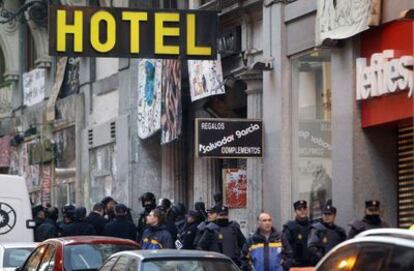Dawn raid provides alarm call for occupiers of downtown Madrid hotel
Around 200 police officers clear unused buildings sheltering evicted people
Units of the National Police on Monday mounted an operation to remove protestors from the Hotel Madrid and from unoccupied rooms above the Albéniz theater in the capital. The raid was launched at 7am by 200 members of the riot squad who blocked the entrance and exits to the two buildings, which are connected by an underground passageway. Despite this subterranean link, the two groups of protestors are apparently unconnected; those who were in the Hotel Madrid pertain to the wider 15-M movement while the occupiers of the Albéniz building claim to have no ties to the former organization.
The police removed 93 people from the hotel and 10 from the buildings adjacent to the theater. All of them stand accused of a charge of illegal seizure of a property. The raid, which was ordered by a Madrid court, uncovered various weapons in both buildings and marijuana plants above the theater.
Around 30 of the protestors were taken to local police stations as they were not carrying any form of identification. A further 10 people were arrested, nine of them for infractions of the Immigration Law and one as the presumed owner of the eight marijuana plants.
The eviction was completed by 9am and police remained at the site awaiting the owner of the building while workers moved to board up the entrances to the abandoned hotel.
"They can't burst in like this, breaking down the doors and not giving us time to collect our things," said Manuel, one of the protestors. "They didn't hit anyone, but there was a lot of pushing and shoving, a lot of tension and hurry. There are four or five families living here temporarily until somewhere can be found for them. Where are they going to go now? It's a disgrace."
The Hotel Madrid was occupied last October 15 following the global protests that took place in some 80 countries worldwide. Around 40 people entered the building on Carretas street in the heart of the Spanish capital, a stone's throw from the main focal point of the Madrid protests, Sol square. During the ensuing two months protestors fortified the hotel against an eviction by reinforcing doors and adding locks. But the main objective of the occupation was not to keep people out, but to take in those who had been evicted from their homes in the city. On October 31 the first "guests" arrived - among them at least two couples and an elderly woman from the Carabanchel neighborhood who had lost her home, which had been repossessed.
The original idea was for the movement to spread across the city, under the slogan "empty building, inhabited building." The occupation of disused property came in response to "a failed state, incapable of guaranteeing the most basic rights, and to put a stop to the more than 240 evictions that take place every day in Spain," the protestors said in a statement.
In late November, protestors took over a building in Concepción Jerónima street, not far from Carretas.
In a small first-floor room in the Hotel Madrid, an advice center for housing and legal affairs was set up and plans hatched for the occupation of further disused public buildings.
On November 10, a banner was extended across the facade of the Albéniz theater. "Space freed since September; here live people who have been evicted and homeless people." Seven protestors opened the doors of the buildings above the theater to 13 people who had been evicted. The organization Friends of the Albéniz was concerned that the famous hall could be damaged but the doors to the theater itself remained closed off. The occupiers had not set foot in the historic stalls.
The reaction to the evictions of Monday morning was swift; a protest was called for 8pm the same evening in Sol, the epicenter of previous rallies. The regional economy chief, Percival Manglano, said that the eviction had been tardy and pointed out that five buildings remain in the hands of protestors across the Madrid area, two of them regional government property. "It could have been carried out much earlier and the central government delegation in the region could have been more proactive," Manglano said.
The spokesman for the governing Popular Party in Madrid, Iñigo Henríquez de Luna, asked the authorities to "act in consequence" if the protest called for Monday evening did not have the necessary authorization.

Tu suscripción se está usando en otro dispositivo
¿Quieres añadir otro usuario a tu suscripción?
Si continúas leyendo en este dispositivo, no se podrá leer en el otro.
FlechaTu suscripción se está usando en otro dispositivo y solo puedes acceder a EL PAÍS desde un dispositivo a la vez.
Si quieres compartir tu cuenta, cambia tu suscripción a la modalidad Premium, así podrás añadir otro usuario. Cada uno accederá con su propia cuenta de email, lo que os permitirá personalizar vuestra experiencia en EL PAÍS.
¿Tienes una suscripción de empresa? Accede aquí para contratar más cuentas.
En el caso de no saber quién está usando tu cuenta, te recomendamos cambiar tu contraseña aquí.
Si decides continuar compartiendo tu cuenta, este mensaje se mostrará en tu dispositivo y en el de la otra persona que está usando tu cuenta de forma indefinida, afectando a tu experiencia de lectura. Puedes consultar aquí los términos y condiciones de la suscripción digital.








































